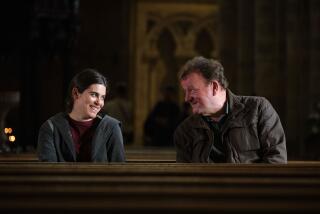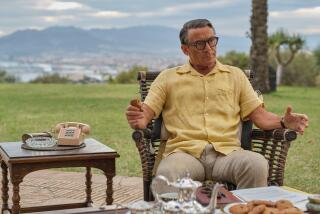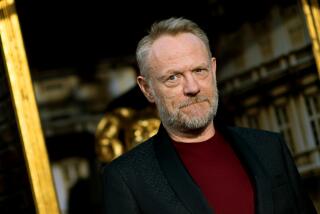The ‘Downton Abbey’ ending upset Allen Leech. Why the movie is redemption
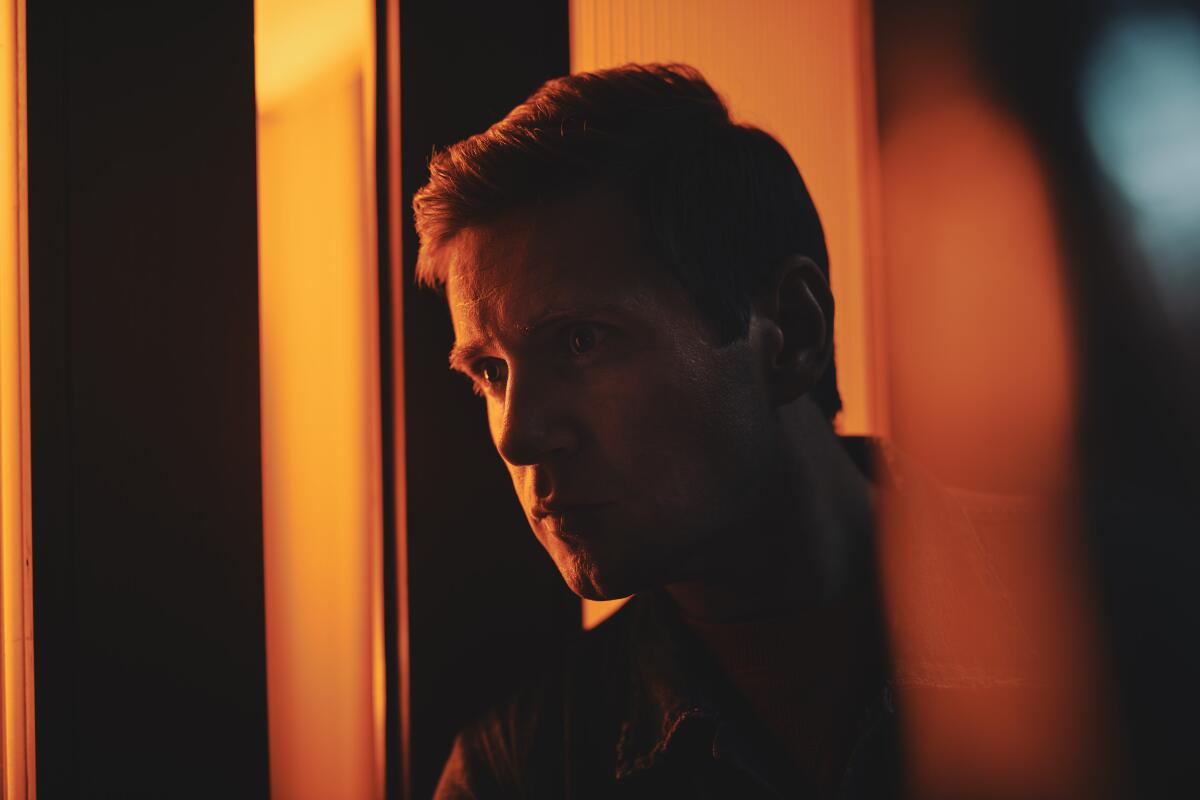
- Share via
LONDON — The end of “Downton Abbey” was, admittedly, a bit of a disappointment for Allen Leech. While many of the beloved characters earned their happy endings, his character, Tom Branson, didn’t quite get the satisfaction.
“I felt that there was a lot left open for him,” says Leech, sitting in a hotel suite in London’s Corinthia Hotel ahead of the premiere of the long-anticipated “Downton Abbey” film. “Which, as an actor, when you’ve had this character for six years, you don’t want that. You want an ending.”
He grins and adds, “Looking back now, I’m delighted because it meant he has this arc in the movie. Had it all been sewn up, I don’t think Tom would have the opportunity to do the things he does in the movie.”
When Leech originally auditioned, “Downton Abbey” creator Julian Fellowes had written the character as a chauffeur from Yorkshire named John Branson. Leech, who hails from Dublin, wanted to do the reading in a Yorkshire accent but Fellowes asked him to play it Irish, saying he had an idea for the character. John became Tom, an Irishman who joins the Crawley family as a replacement for their former driver.
Leech initially signed on for three episodes, first appearing in the fourth episode of season one, with an arc that was meant to see him being fired for romancing Lady Sybil (Jessica Brown Findlay). Branson was introduced as a “socialist, not a revolutionary,” and in his first conversation with Sybil he declared, “I won’t always be a chauffeur.”
At the time, Leech didn’t realize quite how prophetic that line would be. Fellowes and the producers determined to keep him on, eventually marrying Branson and Sybil. When Brown Findlay asked to leave the show at the end of Season 3, Leech was sure he’d be done too. Instead, he signed his first long contract with the show.
“I thought I was gone,” the actor says. “I didn’t think Julian would do the brave thing — which he did — which was, ‘No, let’s keep him there. Let’s have this family be forced to have an outsider, someone they’ve been very hostile toward, sit at that table without his wife and try to find his way.’”
Julian Fellowes’ “Downton Abbey” movie brings Maggie Smith, Elizabeth McGovern, Michelle Dockery, Hugh Bonneville and company to the big screen.
In the film, which centers on King George V and Queen Mary visiting Downton, Branson truly gets his due. He’s the driving force behind several story lines, including a satisfying love story that sees the widowed character finding another chance at a happy ending.
“I felt Tom Branson was the only one we hadn’t really settled in the series,” Fellowes explains. “He’d been a widower for some years by then. He’s a nice man. He’s learned all sorts of things from his rather unusual life of marrying up and getting on with the family of his late wife. I wanted to do something with that.”
“When I first read it I kept going back going, ‘Am I actually doing all of that?’” Leech laughs. “I was really surprised at all of that — I really was. I’m very grateful to Julian for giving me the opportunity.”
Leech credits “Downton Abbey” with helping to push him into the spotlight, although he’s reluctant to call any of his success as an actor “fame.” He began getting recognized on the London Tube during Season 3, but not to a degree where he’s ever stopped taking public transportation. In fact, during press days in New York he usually skips the car service and hops on the subway instead.
He moved from London to Los Angeles to get married (his wife, Jessica Blair Herman, recently announced her first pregnancy) and he’s not interested in buying into any hype about himself, even after the impressive awards run for “Bohemian Rhapsody,” in which Leech played Queen manager Paul Prenter.
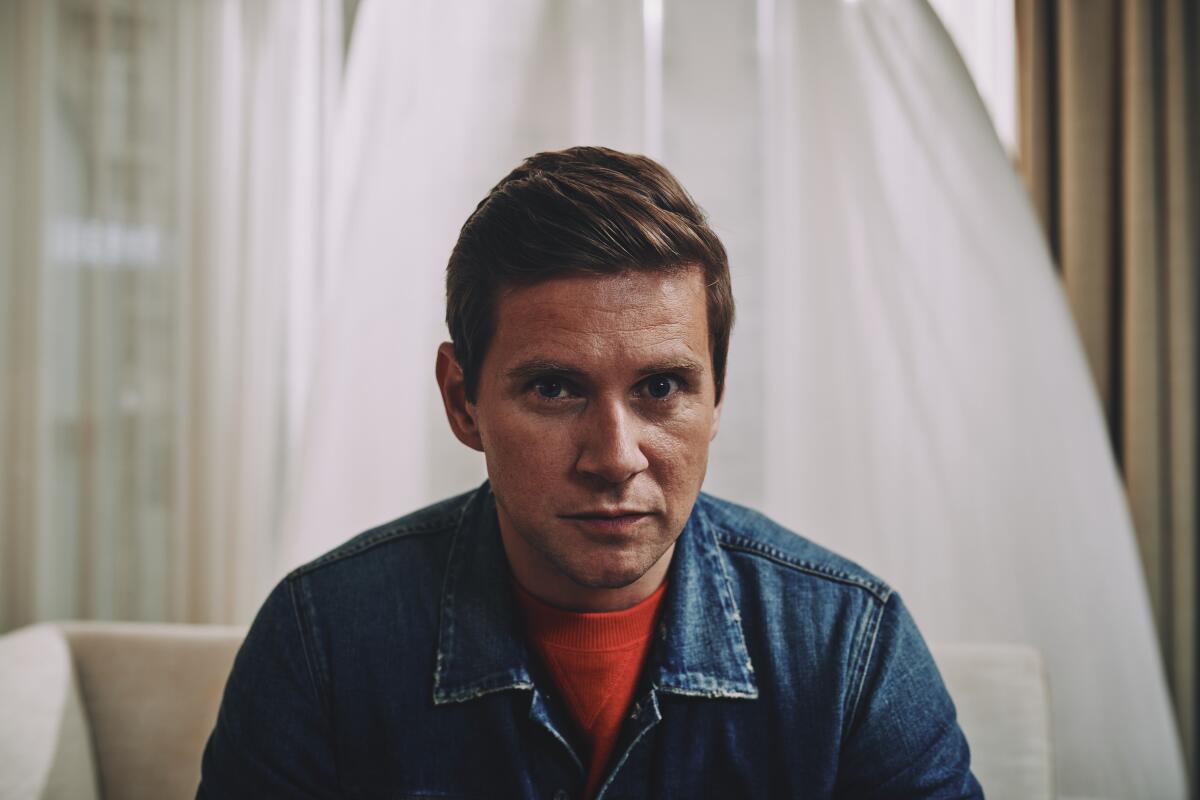
My parents will never let me get too big for my boots.
— Allen Leech
“It’s important to not get stuck too much in that,” says Leech, noting that his friend group in L.A. is mostly made up of people outside the entertainment industry. “Growing my career here in London made a big difference. And my parents will never let me get too big for my boots anyway.”
He adds, as evidence: “My mom always said I should be an engineer or an architect. Before ‘Downton,’ when I was acting and I had done roles but not massive roles, she famously once introduced to me to one of her friends by saying, ‘This is my son Allen, he could have been an architect.’”
Paul Prenter was the first role Leech got that he didn’t audition for. He initially read for the part of Jim Hutton, a much smaller role, and producer Denis O’Sullivan suggested the filmmakers look at him for the villainous Prenter instead.
“That scared me a lot,” Leech admits. “When you go on an audition or do a tape you’re proving to yourself as much as you are to them that you’re right for the role. You’re making those decisions and showing what you can give. But when you don’t have that and you haven’t gone through that process, which was all I ever knew, and suddenly someone is saying, ‘We want you to do this role and we trust you with this role,’ it becomes a lot of pressure.
“It gave me a focus I don’t think I’ve ever had because I was so afraid of not being right. I wanted to do it right and I wanted to prove they took a chance on me for the right reasons. I feel like I upped my game.”
“Downton Abbey” was an international smash hit but bringing the historical soap to the big screen took a massive effort from cast and crew.
Much like on “Downton Abbey,” where the cast remain steadfast friends and meet up for a reunion dinner hosted by Jim Carter in London every year, Leech found his experience in “Bohemian Rhapsody” to be immediately bonding. He saw Rami Malek and Lucy Boynton the night before this interview, in fact, when they went for drinks at the London Edition. And he can do a dead-on imitation of Malek’s voice. (Leech can also perfectly mimic “Downton” co-star Dame Maggie Smith.)
“As it’s been well-documented, it had its turmoil as a production,” Leech notes of “Bohemian Rhapsody,” which was credited to director Bryan Singer, who was fired and replaced during the production by “Rocketman” director Dexter Fletcher. “And even before the success, that blew all of our minds, that solidified us. … That was one of the greatest — and will be one of the greatest — experiences I think I’ll ever have as an actor.”
Since wrapping production on “Downton Abbey,” Leech shot a CBS pilot, “Surveillance,” but the network passed. So he’s still looking for that next great project. The actor, who studied drama and theater at Trinity College and left Dublin for London in 2004, is particularly compelled by Irish stories. He and a friend are working on adapting Claire Keegan’s short story “Walk the Blue Fields” into a short film, which Leech plans to direct.
When asked if his younger self, whose first professional gig at 15 was a production of “A Streetcar Named Desire” at the Gate Theatre in Dublin alongside Frances McDormand, ever imagined this sort of success, Leech is hesitant to admit he has it now.
“I still don’t know if I’m going to succeed,” he says. “And I think that’s an important thing as an actor. I always fret and worry about the next job and I did back then too. Did I ever think I would have the opportunity to do the jobs I have done? No. I FaceTimed home on the way to the Oscars and my dad was like, ‘Just take a moment and remember the kid who wanted to be an actor at age 11 and you’re headed to that awards ceremony now.’ Being a kid from Dublin you watch the Oscars — you don’t think you’re going to be going to them.”
He pauses, considering the question again. “Did I ever think I’d be doing those things? No. It’s funny how life kind of takes you on this trajectory.”
More to Read
Only good movies
Get the Indie Focus newsletter, Mark Olsen's weekly guide to the world of cinema.
You may occasionally receive promotional content from the Los Angeles Times.
